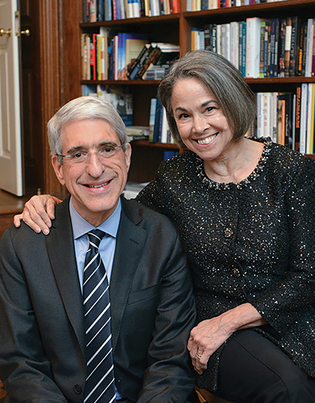
Michael Marsland
The Yale Alumni Magazine publishes a letter in every issue from President Peter Salovey ’86PhD—shown here with his wife, Marta Moret ’84MPH, president of a public health research firm based in New Haven. In this issue, he salutes women who were among the first to enter Yale’s graduate and professional schools.
View full image
Over the past year, Yale has marked two significant milestones in our history: 150 years since the first women were admitted to Yale and 50 years since the beginning of coeducation in Yale College. Starting last September, the entire Yale community—alumni, students, faculty, and staff from across the university—joined together for a year-long commemoration, 50WomenAtYale150. What we learned from one another and from the archives strengthened our understanding of these formative anniversaries and gave us greater insight into women’s tremendous contributions to this university, to our communities, to every field and profession, and to our world. When we launched 50WomenAtYale150 a year ago, I wrote to you about welcoming back to campus the trailblazing women who matriculated at Yale College in 1971, 1972, and 1973. In this message, as we close out the year, I focus on the women who first matriculated at Yale’s graduate and professional schools.
The stories of Yale alumnae are as varied as the university’s history. I have met a number of truly inspirational women who graduated in more recent years through the Women of Yale Lecture Series, which was developed by my wife, Marta Moret. (Marta is herself a woman of Yale; she earned her Master of Public Health degree from the Yale School of Public Health.) Through this series, I had the honor of hosting Maya Lin ’81, ’86MArch, ’87DFAHon; Vera Wells ’71; Anita Hill ’80JD; Patricia Nez Henderson ’94MPH, ’00MD; and Quiara Alegría Hudes ’99 for lectures and discussions on campus.
Of course, the contributions of women as students at Yale stretch back 150 years. These women courageously confronted barriers and reshaped society, and their stories inspire today’s students to make their mark on the world. Marjorie Hope Nicolson, for example, received her PhD in English from Yale in 1920. She was the first woman to be awarded the John Porter Addison Prize for best graduate dissertation at Yale, but that was only the beginning for Nicolson. She later became the first woman president of Phi Beta Kappa and first woman professor of English and comparative literature in the graduate school at Columbia University. Her prestigious career included serving as dean of Smith College and as president of the Modern Language Association.
The first woman graduate of the School of Medicine, Louise Farnam, was an exemplary student and a courageous physician. She received her doctorate in physiological chemistry from Yale in 1916, and then became part of Yale’s first cohort of women medical students and graduated in 1920. After earning the Campbell Gold Prize, an award given to the student with the highest scores on final examinations, Farnam learned Mandarin and moved to China, where she worked at a hospital established by the Yale-in-China Association. Dr. Farnam continued to practice medicine after marrying, starting a family, and moving to England.
As we celebrate coeducation at this pivotal moment in our nation’s history, it is particularly important to remember that ever since women of color arrived at Yale, they played important leadership roles—first as students, then as alumnae. They had to overcome additional obstacles in order to achieve their aspirations and serve society. Jane Bolin ’31LLB was the first black woman to graduate from Yale Law School. In 1939, when the cruelties of segregation were unavoidable in every aspect of life, she became the first and only black woman judge in the United States. She made a difference for countless people. Among her many achievements, as noted in the New York Times, she stopped the practices of assigning probation officers based on race and of placing children in child-care agencies based on ethnic background.
Helen Hagan, the first African American woman graduate of the Yale School of Music (and possibly the first African American woman to attend any school at Yale), graduated in 1912. In the face of virulent racism during the Jim Crow era, Hagan performed as a concert pianist in New Haven and New York and entertained troops in France during World War I. She is buried in New Haven’s Evergreen Cemetery, where her grave, once unmarked, was recently restored and properly memorialized.
The 50WomenAtYale150 celebrations provided an opportunity to learn more about these and other trailblazing alumnae and their extraordinary contributions. We commemorated the conclusion of our anniversary year in September with an online event that included reflections, moderated discussions, in-depth conversations, and performances by exceptional women leaders from all sectors. Recordings of this virtual event are available at the Yale Alumni Association’s website.
Yale alumnae continue to make history as they “improve the world today and for future generations.” Please join Marta and me in honoring all Yale alumnae and their legacy, and in thanking the cochairs, Eve Hart Rice ’73 and Linda Koch Lorimer ’77JD, and everyone who helped imagine and shape the events of 50WomenAtYale150.
 loading
loading